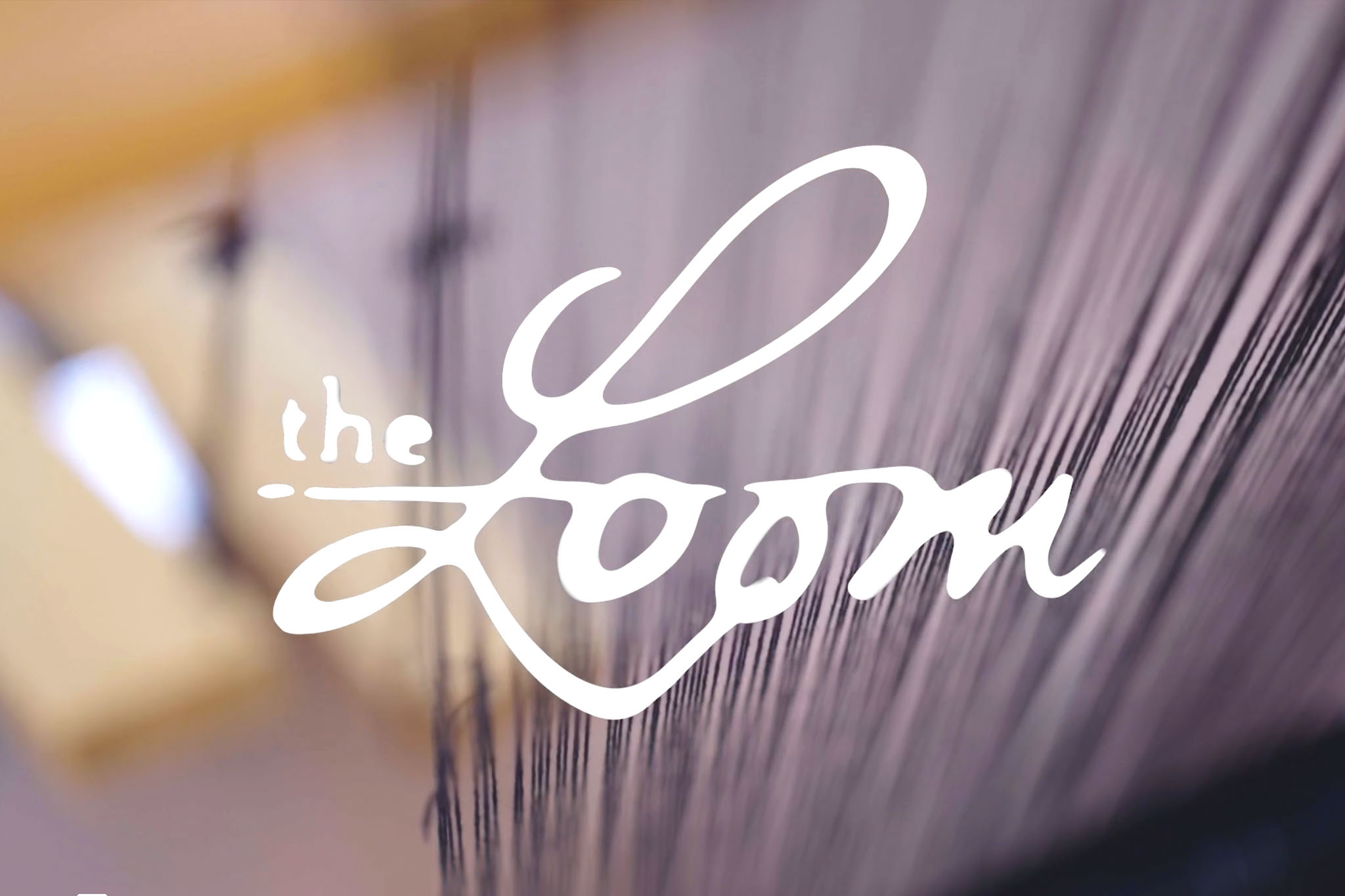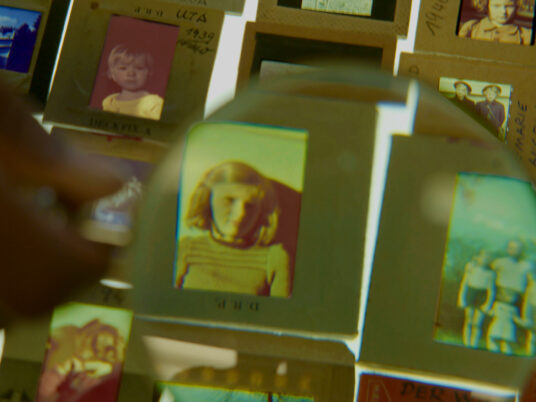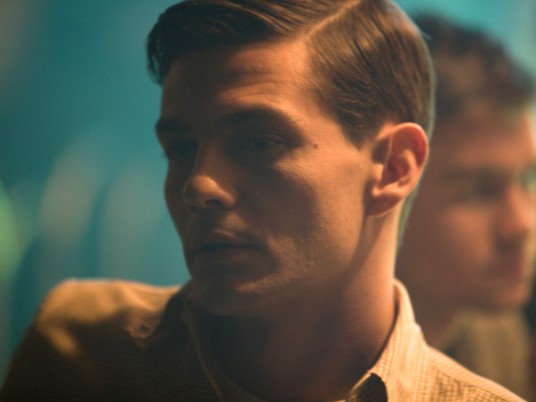The Loom
My cousin shot and killed her four little girls, before turning the gun on her mother and then herself. After decades of collective forgetting, a little loom challenges me to uncover the truth buried within the unspoken tragedy of war. —Helene Kvale
Director / Producer, Adam Briscoe
Producers, Cynthia Kane, Nick Stuart
Co-Producers, Richard Hollant, Katharina Esch, Benno Grzimek
DoP, Jana Laemmerer
Additional Cinematography, Matt Porwoll, Martin Farkas
Executive Producer, James Ivory, Simon Kilmurry
Executive Producers, Monica Belais, Nancy Dickenson, Lillian Garcia, Jenniphr Goodman, Kristin Howard, Richard A. Wilson
Supported by The Merchant & Ivory Foundation
DIRECTORS’ NOTES
Logline: A woman kills her four daughters, her mother and herself. Decades later, the discovery of a child’s loom breaks the silence that endures when women’s bodies become battlefields.
Description: The Loom is a feature length hybrid documentary about family secrets and inherited trauma. Through evocative scenes, interviews, archival materials and art, the film exposes how authoritarian violence impacts three generations of families.
Framing the Film: When filmmaker Helene Kvale was eleven, she overheard a hushed conversation between her mother and grandmother. The story was simple, devastating: her grandmother’s cousin, Hanni Allwelt, killed her four daughters, her mother, and herself in April 1945, as Berlin collapsed under the Red Army’s assault. Hanni, they said, feared what was coming—rape and violence. The story was told once, then buried in silence. Decades later, a small object reawakens the past: a child’s loom, inscribed with the names of Hanni’s daughters—Rosemarie, Angela, Uta, and Vera. The loom had sat on Helene’s mother’s shelf for years, unnoticed. When Helene stumbles upon it, it sparks a need for answers. What drove Hanni to kill her children? And was the family story—the one about protecting them from the Red Army—the whole truth? Helene embarks on a journey that takes her from Norway to Los Angeles and finally to Berlin. In Norway, she finds a trove of letters Albert Allwelt, Hanni’s grieving husband, sent to her grandmother. These letters, adorned with delicate watercolors, paint a portrait of a man shattered by loss. Yet something is missing—the letter that would have revealed what truly happened to Hanni and the girls. In Los Angeles, Albert’s second family remembers him as a man of contradictions: distant, sometimes violent, yet an artist whose delicate work revealed an unexpected tenderness. They believe they have no memorabilia of his first family—until Helene’s persistence unearths a hidden collection of photographs, artwork, and Hanni’s suicide note. Among these artifacts are chilling documents suggesting that Hanni and her daughters were not just victims of war, but of a reality more complex and painful than the family had ever acknowledged. The story passed down about Hanni’s motivations begins to unravel, revealing a history shared by countless women in Berlin—one that was rarely spoken about, even among survivors.
In Berlin, Helene turns to historians and survivors to piece together the truth. The official records are incomplete, redacted. Survivors, however, remember. They speak of a city consumed by violence, of women driven to suicide not just out of fear, but after enduring what some could no longer live with. Historians provide chilling context: the mass rapes in Berlin were not just acts of revenge by the Red Army, but part of a cycle of violence set in motion years earlier by the Nazis themselves. The sexual brutality they inflicted on the Eastern Front returned home with devastating consequences. The silence that followed was not just personal but systemic—shame, guilt, and political narratives obscured the realities faced by German women, like Hanni. The discoveries challenge the daughters’ understanding of their painful childhoods and propel Helene to Berlin in search of answers. There, she finds that details of the fateful day have been redacted from the official records. To better understand the reality of Hanni’s final days, she turns to World War II survivors who speak out about the sexual violence they witnessed as girls. Historians help to fill in the gaps with chilling context about how the sexual violence unleashed by the Nazis on the eastern front eventually made its way back to the doorsteps of German women, like Hanni. As war breaks out in Ukraine, Helene meets Maryna Semenkova, a refugee performance artist in Berlin. For Maryna, the loom is more than an artifact; it is a mirror into her own family’s buried traumas. As she investigates her grandmother’s past, she discovers records of enslavement, forced labor and a child who was taken from her and left to die. The weight of unspoken histories, Maryna realizes, shaped her father, and in turn, herself. “They live in us. It’s just not possible to forget,” she reflects, as she transforms her discoveries into a performance piece that reclaims what was lost. What began as a search for family truth becomes a larger reckoning with how we remember—and how we choose to forget. The Loom is a mystery, an investigation, and an unearthing of stories hidden in silence for too long. It asks: How do we confront the past to break the cycles of violence in our lives? Through art, both Helene and Maryna search for answers, transforming personal and collective trauma into expressions that bear witness to the past and open pathways for healing.
Why This Film? Sexual violence in war is one of history’s greatest silences. It is a weapon used to terrorize, subjugate, and erase. The Nazis wielded it. The Soviets inflicted it. And history, for decades, ignored it. The Loom challenges this silence, bringing to light the hidden stories of women who lived, suffered, and fought to reclaim their narratives. Through archival materials, intimate testimonies, and artistic reinterpretation, the film does more than reconstruct the past—it reminds us that what women endure when societies collapse shapes all of our lives, compelling us to confront these histories with urgency and accountability.
In The Loom, Helene is on a mission to understand her cousin, Hanni Allwelt, one of thousands of women driven to suicide by rape, fear that Red Army soldiers would take revenge for the horrors unleashed by the Nazis, German propaganda, or simply the incomprehensibility of life after war. With rape (or threat of rape) and familicide embedded in the tragedy, it is little wonder that her story was a family secret shrouded in silence. Few historians still question whether the Red Army soldiers engaged in mass rape. A 2021 report from the German Bundestag estimates that over 1.9 million German women and girls were raped by men of the Red Army as they swept into the heart of Germany. In Berlin, the number of women raped between April and September 1945 is estimated at 110,000. Most who survived lived under a veil of silence, fueled by personal shame and a collective reckoning with the magnitude of suffering Germany had unleashed on the world. When the rapes were discussed at all, it was often in the context of anti-communist/pro-western propaganda during the cold war, and later, by neo-Nazis to recast the Germans as victims of the war, making the topic even more difficult to discuss. The rapes committed by Allied soldiers were conspicuously excluded from such discussions. And only recently has detailed attention been given to the horrendous sexual violence unleashed by the German Wehrmacht against the women of Poland and the Soviet Union, as there too such subjects were deemed unworthy of history.
The conspiracy of silence around sexual violence is not a German problem or a Russian problem, but a global problem. Nor is it merely something that affects survivors, but rather it is a trauma that radiates outwards through all of society. A recent fact sheet produced by UN Women states that: Wartime sexual violence is one of history’s greatest silences and one of today’s most extreme atrocities. In many contexts, sexual violence is not merely the action of rogue soldiers, but a deliberate tactic of warfare. It displaces, terrorizes and destroys individuals, families and entire communities, reaching unthinkable levels of cruelty against women of all ages from infants to grandmothers. It can leave the survivors with emotional trauma and psychological damage, physical injuries, unwanted pregnancies, social stigma and sexually transmitted infections. The costs and consequences last for generations. And often, mass rape continues after the guns fall silent and peace treaties are signed. In the eighty years that have passed since the fall of Berlin, mass rape has been reported in nearly every armed conflict. It is a universal problem that demands our attention.
Social Impact The Loom will drive an impact campaign to highlight the insidious nature of gender-based violence in war, specifically rape, and investigate the often uncalculated cost of intergenerational trauma born by families, and the ongoing damage that silence can cause. The campaign will have multiple elements, including an exhibition about the weaponization of sexual violence during WWII and its legacy. Built in collaboration with organizations such as the Karlshorst Museum, Topography of Terrors Museum and the Forced Labor Documentation Center, the exhibit would feature expert and witness testimony, archives and documentation. We intend to capture the reality of women on the Eastern front, like Nadia, whose experiences at the hands of the Nazis were largely erased. We will work with our partners to create supplemental educational material to accompany screenings in academic settings, following the model used by our producer, Nick Stuart on the documentaries “Newtown” and “The Rape of Recy Taylor.” Working with specialist partners, the campaign will create support materials to help educate professional carers on how to talk about related trauma and healing practices. We envision this film will appeal to a broad audience: people interested in the overlooked experience of women, history and WWII, and the healing power of art. The goal of the impact campaign is to educate audiences about the prevalence of conflict related sexual violence, intergenerational trauma and to provide resources and support to give families the ability to break the silences and find ways to talk about these traumas that are passed down from generation to generation.


